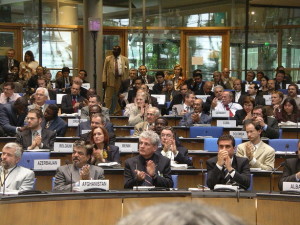Cautiously Optimistic about #COP21

After the failure at Copenhagen a few years back, I didn’t have big hopes for this year’s event. Yet, I’m beginning to think the big Paris climate change conference known as #COP21 may actually accomplish some real change.
Oddly enough, my optimism is rooted in something I would have seen a few years ago as a fatal flaw: that the results will be based in voluntary, not mandatory, compliance.
Why? Because:
- We can’t GET mandatory compliance. In the US, that would require a yes vote in each house of Congress, or even worse, the 2/3 Senate support required to adopt a treaty. But even as far back as Kyoto, US electoral politics had become a toxic swamp of attack-dog partisanship. No climate change bill with teeth is going to pass Congress any time soon. And without US (or China’s) participation, any agreement would be useless.
- The US and China have already agreed to take climate seriously, and have negotiated their own agreement. Weaker than I’d like, but a heck of a good start, and one that seems to have helped apply the brakes on China’s mad rush to coal (the worst scenario for averting climate disaster).
- The business community has woken up. Often a force for conservatism, the business world now understands the catastrophic consequences of failure to make meaningful progress on climate change—and the profits to be made in doing the right thing. If the government won’t act, they will force action through other channels. The emergence of environmental activism among evangelical Christians and even a subset of Tea Party activists who care deeply about the environment is also very encouraging.
- The growing use of carbon markets provides additional financial incentives for cutting carbon.
- New technology makes it easier to do more with less, use. our resources far more effectively, and solve engineering problems with biological thinking (for example, letting bridge engineers study spiderwebs). We understand now, for instance, just how much energy and carbon we can save by going for deep conservation.
- Early discussions about whether the world should agree on a 1.5 degree Celsius vs. 2 degree C cap in global temperatures compared to what existed before the Industrial Revolution means we’ve finally gotten past the question that’s been holding us back for so long: why do we need to contain rising temperatures in the first place? For the first time, the world is pretty much in agreement that it has to be done. Not just scientists, this time, but governments, too. Climate deniers (other than in the US Republican Party leadership, apparently) are now as marginalized as environmental activists were 20 or 30 years ago.
I could keep going, but you get the message—we can do this!
